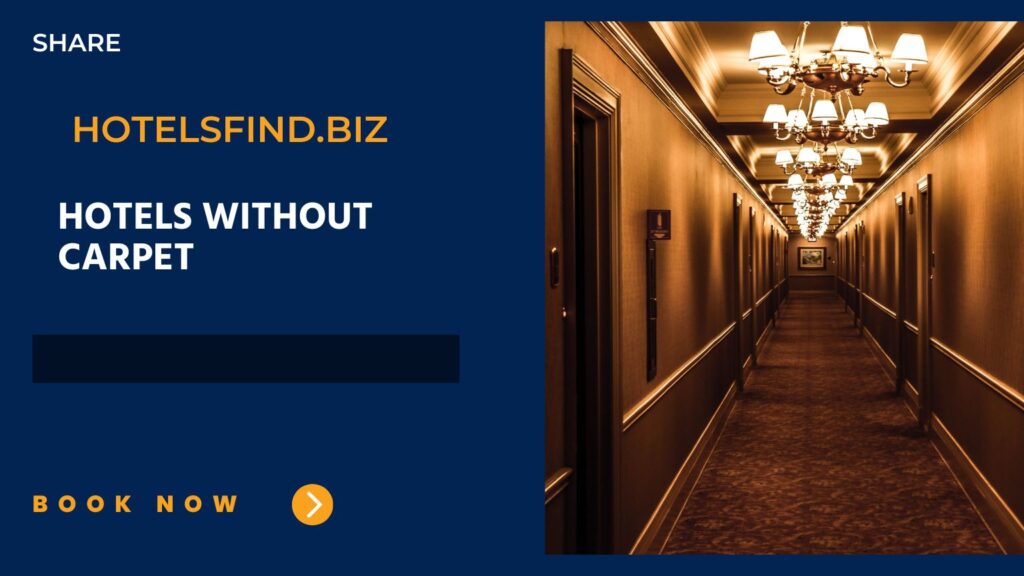Hotels Without Carpet Near Me: (Comfortable Rooms) In 2024
Hotels without carpet have become an increasingly popular trend in the hospitality industry.
While carpet has long been a staple of hotel room design, hotels are now opting for hard flooring options such as hardwood or tile in order to meet the changing needs and preferences of their guests.
This shift towards carpet-free rooms has been driven by a variety of factors, including concerns about cleanliness and hygiene, as well as the desire to create a more modern and stylish aesthetic.
In this article, we will explore the reasons why hotels are moving away from carpet, the benefits of hard flooring options, and what this trend means for the future of hotel room design.

Search Hotels Without Carpet Near Me
Why Are Hotels Moving Away from Carpets?
Traditionally, carpets have been a staple in hotel rooms and common areas. However, there are several reasons why hotels are choosing to eliminate carpets altogether.
Hygiene Concerns
Carpets can accumulate dust, dirt, and other allergens, making them a breeding ground for bacteria and other harmful microorganisms.
This can be particularly concerning for guests with allergies or respiratory issues. By removing carpets, hotels can create a cleaner and more hygienic environment for their guests.
Sustainability
The hospitality industry is increasingly focused on sustainability, and carpets can be a significant contributor to waste.
Carpets need to be replaced regularly, and their disposal can have negative environmental impacts.
By eliminating carpets, hotels can reduce their environmental footprint and demonstrate their commitment to sustainability.
Design Flexibility
Carpets can limit design options for hotels. Without carpets, hotels have more freedom to experiment with different flooring materials, patterns, and colors, allowing them to create a unique and memorable guest experience.
Benefits of Hotels Without Carpets
There are several benefits to eliminating carpets from hotels, including:
Improved Air Quality
Carpets can trap dust, allergens, and other pollutants, reducing air quality. By removing carpets, hotels can improve indoor air quality and provide a healthier environment for their guests.
Enhanced Cleaning Efficiency
Without carpets, cleaning becomes more efficient and less time-consuming. Hard flooring surfaces are easier to clean and sanitize, reducing the time and resources required for daily maintenance.
Modern Aesthetics
Hotel’s without carpets can have a more modern and stylish look, creating a unique and memorable guest experience.
This can be particularly appealing to younger travelers who are looking for trendy and Instagrammable accommodations.
Improved Durability
Carpets can be easily damaged by spills, stains, and heavy foot traffic, requiring frequent replacement.
Hard flooring surfaces, such as wood or tile, are more durable and can last much longer, reducing maintenance costs in the long run.
Challenges of Implementing Hotel’s Without Carpets
While the benefits of hotel’s without carpets are clear, there are several challenges that hoteliers need to overcome to make this change.
Noise
Without carpets, noise levels in hotel rooms and common areas can increase significantly.
This can be particularly problematic in multi-story hotels or in areas with high foot traffic.
Hoteliers need to consider ways to mitigate noise levels, such as using sound-absorbing materials or installing thick curtains.
Slipperiness
Some hard flooring surfaces, such as tile or polished concrete, can be slippery when wet, increasing the risk of slips and falls.
Hoteliers need to ensure that appropriate measures are taken to minimize slipperiness, such as using slip-resistant materials or adding non-slip mats.
People also ask
Why do hotels still have carpet?
Hotels still have carpet for several reasons.
Carpet is a popular flooring choice because it is relatively inexpensive, easy to install, and can help to reduce noise.
Additionally, carpet can provide a more comfortable and cozy feel to hotel rooms, which can be important for guests looking for a home-away-from-home experience.
However, some hotels are starting to move towards hard flooring options such as hardwood or tile for easier maintenance and cleanliness.
What is the best floor to stay on in a hotel?
The best floor to stay on in a hotel can depend on your personal preferences and needs.
Some people prefer staying on higher floors for better views and less noise from street-level activity.
However, staying on lower floors can also be convenient for quick access to amenities such as the lobby, restaurant, or pool.
Additionally, staying on a floor close to the elevator can make it easier to come and go quickly.
It is also a good idea to inquire about any potential noise disturbances or construction work that may be happening on certain floors before making a decision.
What is the safest floor to stay on in a hotel?
In general, any floor in a hotel can be considered safe as long as the necessary security measures are in place,
such as secure locks, functioning fire alarms, and emergency exits.
However, some people may feel more comfortable staying on higher floors as they may be more difficult to access for unauthorized individuals.
Additionally, it is always a good idea to research the hotel’s safety record and location and to take precautions such as not opening the door to strangers,
keeping valuables secured, and reporting any suspicious activity to hotel staff or authorities.
Conclusion
In conclusion, hotel’s without carpets have become a popular choice for many travelers due to their ease of maintenance and cleanliness.
Hard flooring options such as hardwood or tile can be easier to clean and sanitize, which is especially important during times of heightened concern about hygiene and safety.
Additionally, some guests may have allergies or sensitivities to carpet fibers and may prefer the reassurance of a carpet-free room.
While carpet may still be a popular option for some hotels, the trend towards hard flooring options is likely to continue as hotels seek to meet the evolving needs and preferences of their guests.







